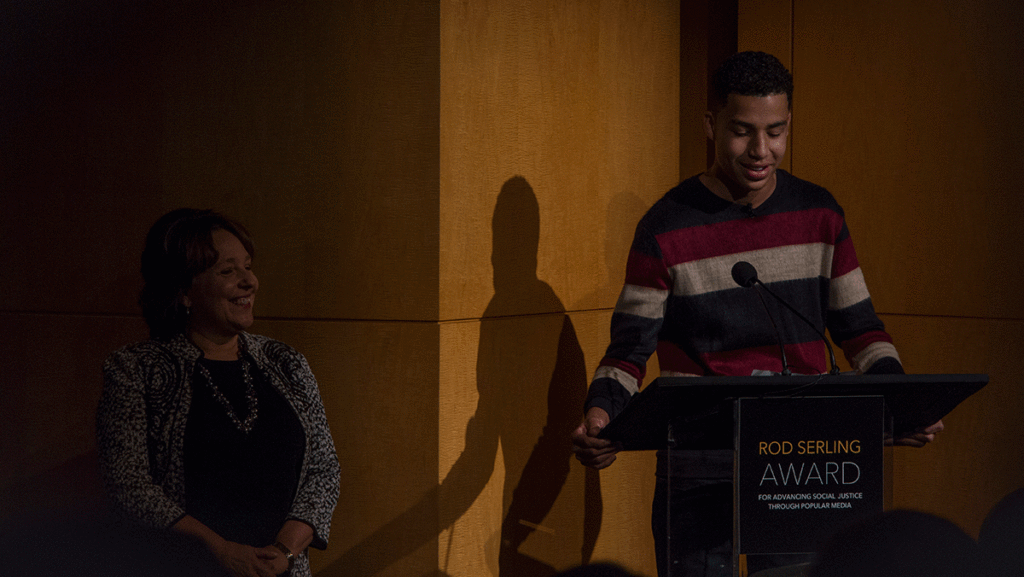Ithaca College has recognized Kenya Barris, executive producer and creator of the ABC comedy “Black-ish,” with the college’s Rod Serling Award for Advancing Social Justice Through Popular Media.
“I think that I’ve been given a unique opportunity to tell a story and start conversations, and I think that’s the most important thing any artist can do,” Barris said during his acceptance speech at the Rod Serling Award ceremony the evening of Nov. 16. “We just try to give you as many different points of view so you can have conversations that you might have at one point been afraid or uncomfortable to have.”
The award commemorates Rod Serling, who taught at the college from 1967 to 1975. Diane Gayeski, dean of the Roy H. Park School of Communications, said Serling’s television show “The Twilight Zone” received critical acclaim for its complexity and social relevance. The Serling Award honors a current media figure whose work sheds light on inequality and discrimination.
The first Rod Serling Award was given in February to writer David Simon for his work on HBO’s “Show Me a Hero,” the story of racial tension in Yonkers, New York, in the early ’90s.
The most recent award ceremony took place in the Paley Center in Los Angeles. The audience consisted of students, alumni and members of the industry.
Barris previously wrote for the TV series “Are We There Yet” and is co-creator of “America’s Next Top Model.” “Black-ish” deals with complex social issues, particularly those pertaining to racial identity in modern America.
Gayeski presented Barris with the award during the ceremony. She said she believed Barris was a worthy successor to Serling’s legacy of raising difficult social and political issues.
“He is also involved in a lot of other projects that are very well–known and is getting a lot of attention for his creativity and — similar to Rod Serling — for tackling some very important, fairly sensitive social issues in a way that is accessible and attractive to the public,” she said.
Gayeski said she sees the award as a multifaceted opportunity — a chance to honor Serling, a chance to recognize modern attempts to speak out against injustice and a chance to integrate the college’s students into the vast media industry.
“It’s a way we reinforce Ithaca College’s identity and our commitment to excellence in communications,” Gayeski said. “Students are invited as guests, so they’ll have a great opportunity to mingle with a lot of intellectual people from the industry who are attending tonight.”
Actor Marcus Scribner, who plays the role of Andre Johnson Jr. on “Black-ish,” co-presented the award with Gayeski. During his speech, Scribner praised Barris for providing him with the freedom to portray difficult social issues.
“He’s been such a role model to me,” he said. “It’s been a blessing working on the show and getting to tell these very important stories every single week, and Kenya just makes it so much easier because he writes what’s important and what’s going on in society in that moment, and he allows us actors the creative freedom to perform these words and give the performance of our lives.”
A brief montage of “Black-ish” played before Gayeski and Scribner presented the Serling Award, and a smattering of praise from The New York Times, Variety and other notable publications flashed up on the screen. When Barris finally took the stage, he recollected the realities of the marginalized in America and discussed the bitterness that can arise from institutional oppression.
“As a member of a disenfranchised group, one of the things I have always taken and learned from my people is we’ve never gotten our way,” he said. “The brilliance and beauty of my culture that I’ll always love is that we still send our kids to school, believe in this dream, live in neighborhoods that people are often afraid to drive through and believe in this country, even when it doesn’t believe in us.”
Barris discussed the current state of the United States — both the progress over the last half-century and the current political strife rampant in the wake of the recent election. Teary–eyed, Barris said the American people should come together and live up to the country’s potential.
“Let’s reach across and stop calling 50 million people crazy, and let’s have them stop calling us crazy, and let’s find that middle ground, and let’s find a way to make this country a better place,” he said.














